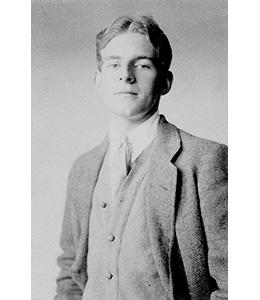Died of wounds aged 21
Buried at sea
Christopher was born in London, the second son of the Revd Dr Percy Dearmer and his wife Jessie Mabel Pritchard, nee White. He was baptised by his father at St Anne’s Church, South Lambeth on 23 April 1894.
He was educated at Temple Grove and then at Charterhouse in Girdlestoneites House from Oration Quarter (autumn term) 1908 to Long Quarter (spring) 1910.
He was at Christ Church 1913-1914, went to Hanover to study German, Moscow and the Crimea to study Russian, and was in Tours learning French when the War broke out. He wrote to his mother, “I am coming home to enlist. Your loving son Christopher”.
He returned to England, enlisting in the Public Schools Corps in August, and being commissioned Lieutenant in the Armoured Car Section of the RNVR and RNAS in October 1914.
“Because of his proficiency in languages Christopher had been quickly promoted and could have remained in a staff job far from enemy action, but that was not his wish. At last he was given 3 choices, all honourable, but one led to the deadly shores of Suvla Bay. It is said that ‘the powers that be’ came aboard the ship moored in Suvla Bay to try and persuade him not to join the troops ashore, but he was bored and anxious for action, so reluctantly he was told “you can go if you must”.
“For 10 days he tasted battle then on 6 October a stray shell hit his tent, falling almost into his lap. He was taken aboard HM Hospital Ship Gloucester. A letter to his father said “he had no pain and was rather inclined to sleep, and that evening at seven he died, and they buried him at sea before bed-time.”
From Donald Gray’s biography of Percy Dearmer
His Estate amounted to £75 17s 1d. Administration with Will granted to Marian Jane Knowles, wife of Arthur Knowles, attorney of Geoffrey Dearmer.
His mother, Mabel Dearmer, was an actress, novelist, illustrator, playwright, theatre producer, vicar’s wife, and mother – she wrote a book of her letters to a friend just before and after the outbreak of the First World War. That friend published them in 1915 (Letters from a Field Hospital). These letters chronicle her reactions to the impending war, the news of which reached her while she was recuperating from an exhausting London theatre production in the Cotswolds village of Oakridge Lynch.
Hardly any families were left untouched by the horrors of the First World War and the Dearmers were no exception, although at first Mabel Dearmer could see no connection between her own life and the momentous happenings beginning to unfold on the Continent.
“I knew nothing of European complications and cared less. The murder of an Archduke meant no more to me than some tale of an imaginary kingdom in Zenda. … I did not hate the enemy, I hated the spirit that made war possible…”
Then her sons enlisted and suddenly war became a very real threat. “…I envied the proud mother who sends her sons, proud of them, proud of the war that calls them out, proud of the God of battles. But that God is not my God, and my heart was heavy.” She returned to London and helped with European refugees while continuing with her theatre work until her husband, Percy Dearmer, offered to go to Serbia as an army chaplain. On the same day, she decided to accompany him and accepted a posting as a hospital orderly: “Here was the work for which I had waited. I had no doubt and no hesitation. Every tie that could keep me in England had been cut, every difficulty removed from my path.” Her husband reacted calmly to her announcement that she too was to go to Serbia. “What fun” was his only comment.
In Serbia, she suffered from overwork, the mud, the fleas, prickly heat and the now intimate knowledge of war. “This war will not bring peace – no war will bring peace – only love and mercy and terrific virtues such as loving one’s enemy can bring a terrific thing like peace.”
On 11 July 1915, three months after leaving Britain, Mabel Dearmer died of enteric fever at Stobart Hospital, Kragujevac, Serbia. Her friend the editor wrote of her: “It is easy to go into danger when convinced that your country’s cause is righteous; she thought that for all countries war was unrighteous, yet she went.”
Her life, and that of her younger son Christopher, fatally injured only months after his mother’s death, are commemorated on the war memorial fountain in Oakridge Lynch, near Stroud, Gloucestershire.
In memory of MABEL DEARMER who went from Oakridge the place she loved best to give help in Serbia where she died of fever at Kragujevac on July 11th. 1915, and of CHRISTOPHER DEARMER who died of wounds at Suvla Bay of Gallipoli on October 6th. 1915 aged 21. Proud of the war all glorious went the son. Loathing the war all mournful went the mother. Each had the same wage when the day was done. Tell me was either braver than the other. They slept in mire who went so comely ever. Then when you wash let the thought of them abide. They knew the parching thirst of wounds & fever. Here when you drink remember them who died.
Christopher is commemorated on the Chatham Naval Memorial.
His brother Geoffrey had preceded him to Christ Church, the previous year, and survived the War. Their father was editor of the English Hymnal in 1906 and Songs of Praise in 1925.
(from the Charterhouse Archives)


